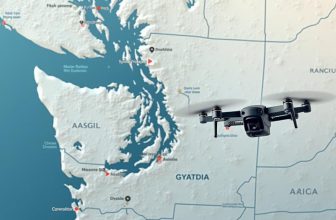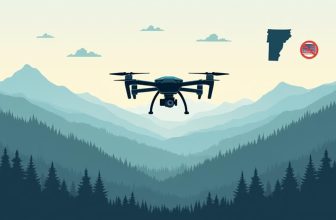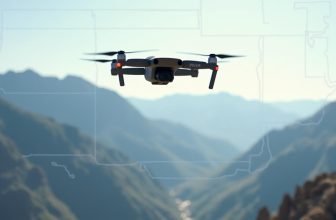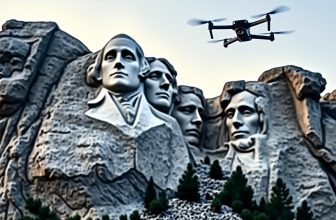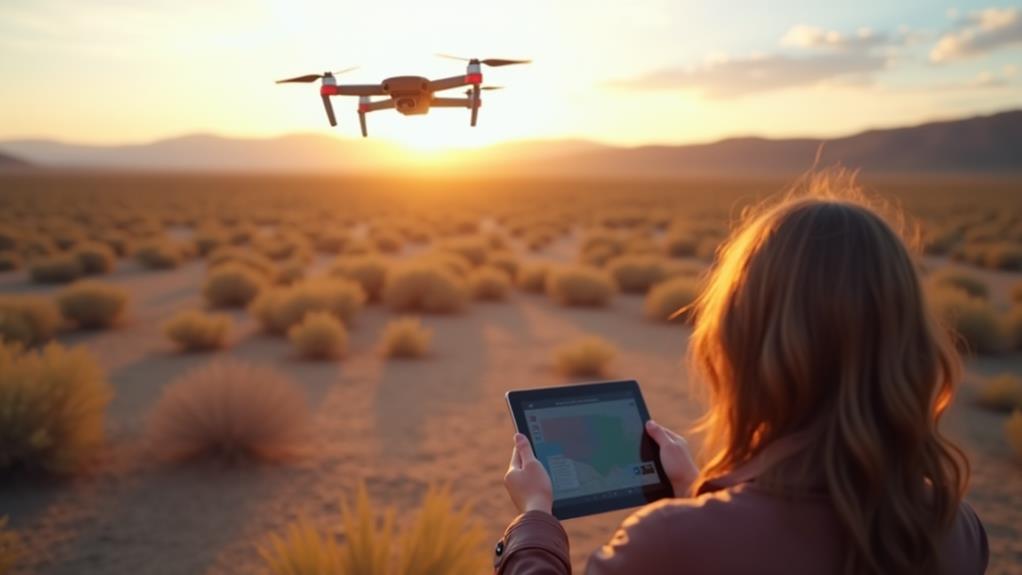
Imagine flying your drone over the scenic landscapes of New Mexico, capturing breathtaking views for a commercial project, but unknowingly violating airspace restrictions near Albuquerque International Sunport. You've just been stopped by authorities, and you're not sure what regulations apply. As a drone operator in New Mexico, you're subject to a complex set of laws and regulations. To avoid fines and penalties, it's vital to understand the rules governing recreational and commercial drone use in the state. What specific laws and regulations do you need to follow to guarantee compliance and avoid unwanted encounters with the authorities?
Contents
Key Takeaways
- Recreational drones in New Mexico must be registered with the FAA if they weigh between 0.55 and 55 pounds.
- Drones are prohibited from flying over people, near airports, national parks, or in areas with temporary flight restrictions.
- Commercial drone pilots in New Mexico must obtain a remote pilot certificate with a small UAS rating from the FAA.
- Drone operators must respect private property and obtain permission from landowners before flying over their land in New Mexico.
- New Mexico's laws prohibit using drones to collect personal data without consent, and operators must protect personal data collected during operations.
Recreational Drone Use Regulations
New Mexico's recreational drone users must comply with the state's regulations, as well as the Federal Aviation Administration's (FAA) guidelines, to guarantee safe and responsible operation of unmanned aerial vehicles (UAVs).
You must register your drone with the FAA if it weighs between 0.55 and 55 pounds. Additionally, you'll need to label your drone with your registration number and carry proof of registration during flight.
When operating your drone, you must maintain a visual line of sight and stay below 400 feet above ground level.
You're also prohibited from flying over people or in areas with temporary flight restrictions, such as near airports or national parks.
To confirm Drone Safety, you should follow best Flight Practices, such as checking the weather and air traffic before takeoff and being aware of your surroundings during flight.
You must also respect private property and obtain permission from landowners before flying over their land.
Commercial Drone Pilot Requirements
When operating drones for commercial purposes in New Mexico, you'll need to meet specific requirements to guarantee safe and responsible UAV operations.
As a commercial drone pilot, you must be aware of the regulations set by the Federal Aviation Administration (FAA) and the state of New Mexico.
To operate a drone commercially, you'll need to meet the following requirements:
1. Pilot Certification: Obtain a remote pilot certificate with a small unmanned aircraft systems (sUAS) rating from the FAA.
This requires passing a knowledge test and being at least 16 years old.
2. Drone Registration: Register your drone with the FAA if it weighs more than 0.55 pounds and less than 55 pounds.
3. Drone Insurance: Obtain liability insurance that covers damages or injuries caused by your drone.
This isn't required by the FAA but is highly recommended.
4. Adherence to FAA Regulations: Familiarize yourself with and follow all FAA regulations, including right-of-way rules and airspace restrictions.
Airspace Restrictions and Zones
As you prepare to operate your drone commercially, it's equally important to understand the airspace restrictions and zones that apply to your operations.
New Mexico's airspace is subject to various restrictions, which you must comply with to guarantee safe and lawful flight operations. The state has designated several airspace zones, including airports, national parks, and military bases, where drone operations are restricted or prohibited.
For instance, the Albuquerque International Sunport and Roswell International Air Center have specific airspace limitations that you must be aware of before flying your drone in these areas.
Additionally, flight restrictions apply to areas with Temporary Flight Restrictions (TFRs), such as those imposed during wildfires or other emergencies.
You must also be aware of airspace limitations near nuclear power plants, correctional facilities, and other sensitive areas. Familiarize yourself with these restrictions and zones to avoid violating federal and state regulations, which can result in fines or even loss of your commercial drone privileges.
Compliance with airspace restrictions and zones is vital to guarantee safe and responsible commercial drone operations in New Mexico.
Drone Registration and Permits
To operate a drone commercially in New Mexico, you must register it with the Federal Aviation Administration (FAA) if it weighs more than 0.55 pounds.
This registration is a requirement under the FAA's Small Unmanned Aircraft Rule (Part 107). You can register your drone online through the FAA's website and pay a $5 fee.
Requirements to register your drone:
- *Your drone must weigh more than 0.55 pounds and less than 55 pounds.*
- *You must be at least 13 years old to register a drone.*
- *You must provide your name, email address, and physical address.*
- *You must label your drone with the registration number provided by the FAA.*
You may be eligible for Federal exemptions if you meet certain requirements, such as operating in a closed-set environment or conducting aerial photography for a motion picture or television production.
Additionally, you may want to contemplate purchasing drone insurance options to protect yourself and others in case of an accident or damage.
Privacy Laws and Enforcement
Having registered your drone and obtained necessary permits, you're now ready to focus on another vital aspect of New Mexico's drone laws: safeguarding people's right to privacy.
As a drone operator, you must be aware of the state's data protection regulations and surveillance concerns. New Mexico's laws prohibit the use of drones to collect personal data without consent.
You're not allowed to capture images or videos of individuals in private settings, such as homes or backyards, without their explicit permission.
To guarantee compliance with these regulations, you must implement measures to protect personal data collected during drone operations.
This includes encrypting data, limiting access to authorized personnel, and securely storing sensitive information.
Additionally, you must be transparent about your data collection practices and provide adequate notice to individuals whose data is being collected.
Failure to comply with these regulations may result in fines and penalties.
It's vital to familiarize yourself with New Mexico's data protection laws and surveillance concerns to avoid any potential issues.
Frequently Asked Questions
Can Drones Be Used for Aerial Photography at Weddings?
You can use drones for aerial photography at weddings, but guarantee you obtain necessary wedding permits and follow drone etiquette, such as respecting guests' space and minimizing noise to avoid disrupting the ceremony.
Do I Need Insurance to Fly a Drone in New Mexico?
Like Icarus, you don't want to fly too close to financial ruin. If you're flying a drone in New Mexico, you'll likely need insurance to cover drone liability, as general aviation coverage may not be sufficient.
Can I Fly a Drone Near Wildlife Refuges or National Parks?
When flying near wildlife refuges or national parks, you must avoid wildlife disturbance and stay outside refuge boundaries. You're also required to follow specific regulations and obtain permits prior to flight operations in these protected areas.
How Do I Report a Lost or Stolen Drone in New Mexico?
You'll report a lost or stolen drone by contacting local authorities and the FAA's drone registry. For theft protection, keep records of your drone's make, model, and serial number to aid in recovery and investigation efforts.
Can Minors Operate Drones for Recreational Purposes?
You're likely unaware that minors operating drones for recreational purposes requires careful consideration. In New Mexico, you'll need parental consent if you're under 13, and must adhere to age restrictions, typically 13 or older, for solo flights.
Conclusion
You've made it through the thrilling world of New Mexico drone laws. Pat yourself on the back – you're now an expert on not getting arrested or sued while flying your drone. In all seriousness, these regulations are in place for a reason. Respect the rules, respect the airspace, and respect people's privacy. Don't be that person who thinks they're above the law – register, obtain permits, and follow the rules to guarantee a safe and enjoyable drone-flying experience.



